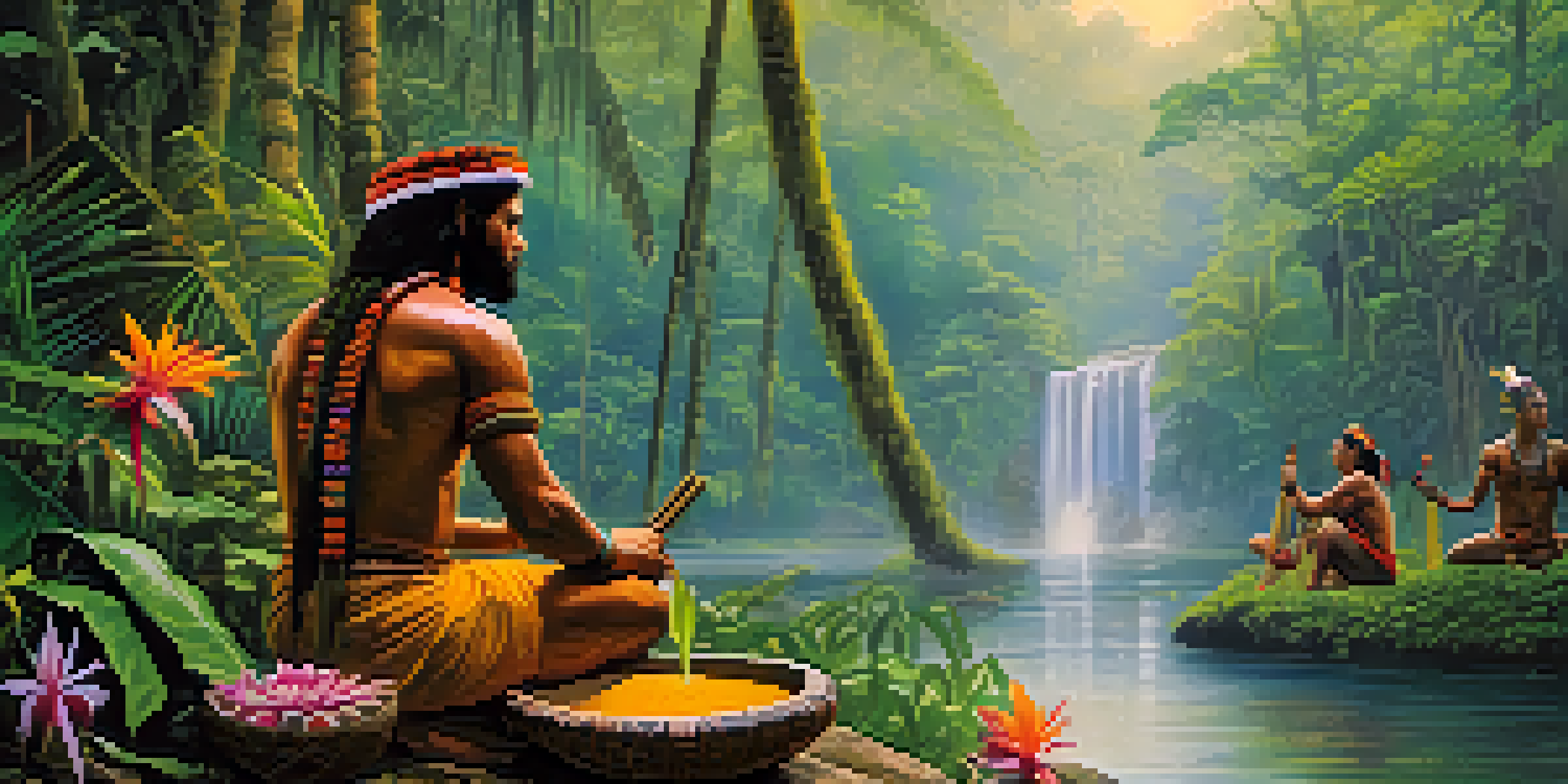Ayahuasca in the Age of Global Connectivity and Sharing

Understanding Ayahuasca: A Brief Overview
Ayahuasca is a traditional Amazonian brew, often used for spiritual and healing purposes. It combines two plants, the Banisteriopsis caapi vine and the Psychotria viridis leaf, which together create a powerful psychoactive experience. Many people turn to Ayahuasca seeking personal growth, healing, or deeper spiritual insights. Its use has a rich history among indigenous cultures in South America, where it serves as a sacred tool for rituals and ceremonies.
The plant is a teacher; it teaches you about yourself and your place in the universe.
In recent years, Ayahuasca has gained global attention, attracting individuals from all over the world. With increasing interest, many seekers are eager to experience its transformative effects. However, this surge in popularity also raises important questions about cultural appropriation and the commercialization of these ancient practices. As more people embark on journeys to partake in Ayahuasca ceremonies, the need for respectful engagement becomes paramount.
Understanding the roots of Ayahuasca is essential for anyone considering its use. By appreciating the cultural context and the wisdom of the indigenous communities, individuals can approach their Ayahuasca experience with greater respect and awareness. This connection to tradition not only enriches the experience but also fosters a sense of responsibility towards the cultures that have safeguarded this knowledge for generations.
The Role of Social Media in Ayahuasca Awareness
Social media platforms have transformed how we share experiences, including those related to Ayahuasca. Travelers often document their journeys, sharing insights, photos, and videos that entice others to explore this spiritual path. This digital storytelling has made Ayahuasca more accessible than ever, with people readily exchanging tips and advice on finding reputable retreats and shamans.

While social media acts as a catalyst for awareness, it can also lead to misinformation. Due to the lack of regulation in the Ayahuasca industry, some individuals may promote unsafe practices or exploitative retreats. It’s crucial for seekers to approach this information critically, verifying sources and ensuring they engage with reputable guides and facilitators. A discerning eye can help navigate the vast sea of content available online.
Cultural Respect is Essential
Engaging with Ayahuasca requires understanding and appreciating the indigenous cultures that have preserved its traditions.
Moreover, the social media landscape encourages a community of like-minded individuals to connect. Online forums and groups allow people to share their transformative experiences, creating a supportive network for those interested in Ayahuasca. This sense of community can be invaluable, offering both encouragement and shared wisdom as individuals embark on their own journeys.
Cultural Appropriation vs. Cultural Appreciation
As Ayahuasca gains popularity globally, the line between cultural appropriation and appreciation can become blurred. Cultural appropriation occurs when one culture adopts elements of another, often without understanding or respecting its significance. In contrast, cultural appreciation involves recognizing and valuing the traditions and practices of a culture while honoring its origins.
Cultural appreciation involves understanding and valuing the traditions of others, while cultural appropriation often lacks that depth of respect.
For those drawn to Ayahuasca, it’s vital to engage in cultural appreciation. This means seeking to learn about the indigenous communities that have preserved Ayahuasca traditions for centuries. It also entails supporting these communities, whether through ethical tourism or by giving back in meaningful ways. A respectful approach not only enriches the individual's experience but also helps sustain the cultures that have nurtured this sacred plant.
Recognizing the distinction between appropriation and appreciation is crucial for fostering a responsible relationship with Ayahuasca. By prioritizing education and respect, seekers can contribute positively to the ongoing dialogue about cultural exchange. This mindful approach helps ensure that Ayahuasca remains a spiritual tool rooted in its rich heritage, rather than merely a trend driven by consumerism.
The Impact of Global Retreats on Local Communities
The rise of Ayahuasca retreats has created new economic opportunities for many local communities in the Amazon. These retreats often provide jobs and attract tourism, benefiting the local economy. However, this influx can also lead to challenges, including the potential for exploitation and the disruption of traditional practices as communities adapt to meet tourist demands.
It's essential for retreat organizers to work collaboratively with local communities, ensuring that they are not only benefitting economically but also preserving their cultural integrity. A model of ethical tourism can help bridge the gap between the needs of tourists and the desires of indigenous peoples. This partnership can lead to more authentic experiences for visitors while empowering local communities.
Ethical Tourism Matters
Travelers should prioritize sustainability and ethical practices when participating in Ayahuasca retreats to ensure positive impacts on local communities.
By prioritizing local involvement, Ayahuasca retreats can create a more sustainable model that respects both the traditions of indigenous cultures and the interests of global seekers. Such collaboration fosters mutual respect and understanding, allowing for the rich tapestry of Ayahuasca to be shared in a way that honors its origins.
Digital Detox: The Irony of Seeking Connection
In a world dominated by screens and constant connectivity, many individuals turn to Ayahuasca as a means of disconnecting from technology. The irony lies in the fact that people often share their Ayahuasca experiences online, seeking validation and connection, even as they pursue a deeper, more personal journey. This juxtaposition raises intriguing questions about the nature of connection and disconnection in our modern age.
During Ayahuasca ceremonies, participants often experience profound moments of introspection and clarity. These experiences can lead to a desire to step away from the digital noise and focus on what truly matters. Yet, after such transformative moments, the urge to share these insights online can be strong. Balancing the desire for connection with the need for personal reflection is a challenge many face.
This digital detox aspect of Ayahuasca invites seekers to consider how they engage with technology in their lives. By acknowledging the impact of social media and digital communication on their experiences, individuals can find ways to share their journeys that honor both their personal growth and the traditions of Ayahuasca. This mindful approach fosters a deeper understanding of what it means to connect in a world that often feels overwhelmingly connected.
Navigating the Ethics of Ayahuasca Tourism
As Ayahuasca tourism continues to grow, ethical considerations come to the forefront. Travelers must be aware of the potential impacts their presence has on local cultures and ecosystems. Responsible tourism involves more than just seeking a transformative experience; it requires an understanding of the ethical implications of participating in such ceremonies.
Choosing retreats that prioritize sustainability and ethical practices is crucial for those venturing into the Ayahuasca space. Researching the retreat's background, practices, and the treatment of local communities can help ensure that tourists contribute positively to the areas they visit. Ethical tourism fosters a reciprocal relationship that benefits both visitors and hosts, promoting a more respectful exchange of culture and knowledge.
Social Media's Double-Edged Sword
While social media enhances awareness of Ayahuasca, it can also spread misinformation, making it crucial for seekers to verify sources.
Ultimately, navigating the ethics of Ayahuasca tourism is about being an informed and conscious traveler. By engaging thoughtfully and respectfully, seekers can enjoy their journeys while also supporting the preservation of the cultural heritage surrounding Ayahuasca. This approach not only enhances the personal experience but also enriches the lives of the communities that share their wisdom.
The Future of Ayahuasca in a Globalized World
As we look to the future, the role of Ayahuasca in a globalized world remains uncertain yet promising. The continued interest from western seekers could lead to a broader acceptance and understanding of indigenous practices. However, it also presents challenges in terms of maintaining the integrity of these ancient traditions amidst commercialization and mass tourism.
The future of Ayahuasca will depend largely on how both seekers and local communities navigate this evolving landscape. Collaborative efforts that prioritize education, respect, and sustainability will be essential for preserving the richness of Ayahuasca practices. By fostering dialogues between cultures, we can ensure that Ayahuasca remains a meaningful spiritual tool rather than a mere commodity.

In essence, the connection between Ayahuasca and the modern world reflects a broader narrative about globalization and cultural exchange. As we engage with these ancient practices, we must strive to create a future where Ayahuasca continues to thrive in its authentic form, honoring the wisdom of the past while adapting to the needs of the present. This balance will be key to ensuring that the spirit of Ayahuasca remains alive for generations to come.